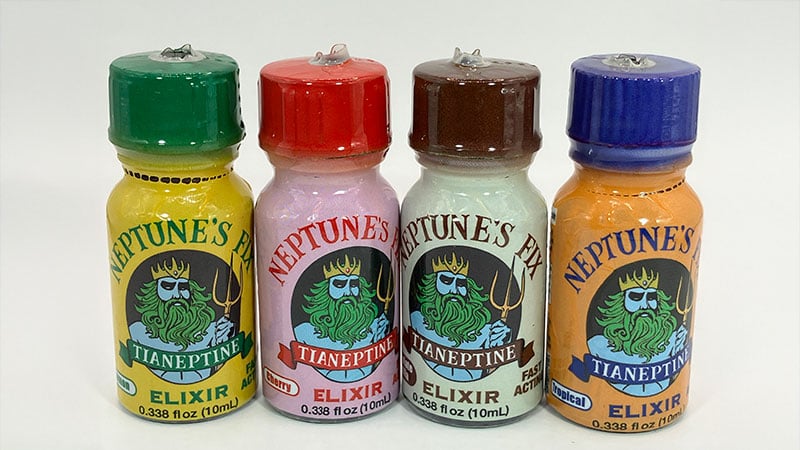A dangerous substance nicknamed “gas station heroin” is raising alarm among health officials across the United States. These brightly colored bottles, often sold at convenience stores, gas stations, and smoke shops, contain tianeptine – a drug that mimics opioid effects but exists in a troubling regulatory gray area.
Tianeptine is approved as an antidepressant in several European, Asian, and Latin American countries, but has never received FDA approval for any medical use in the U.S. Despite being illegal to sell as a supplement here, tianeptine products remain widely available under brand names like Zaza, Tianaa, Neptune’s Fix, Pegasus, and TD Red.
“It’s kind of this grey area of consumer products, or supplements, where the contents are not regulated or tested the way they would be with a medication,” explains Dr. Diane Calello of the New Jersey Poison Information and Education System.
Tianeptine works by binding to the same brain receptors as opioids like oxycodone, producing similar euphoric effects. At higher doses – often 100 times greater than therapeutic doses used abroad – it can cause dangerous side effects including slowed breathing, seizures, low blood pressure, and unconsciousness.
The public health threat is growing rapidly. Poison control centers report a 525% increase in tianeptine-related calls between 2018 and 2023, with a staggering 1,400% increase from 2015 to 2023. About 40% of these cases required medical attention, with more than half needing critical care.
In a cluster of cases from June to November 2023 in New Jersey, researchers documented 20 emergency cases linked to Neptune’s Fix. Users experienced rapid heartbeat, low blood pressure, and seizures, with over a dozen patients requiring intensive care. Analysis revealed the product also contained synthetic cannabis.
Similar Posts
“You never quite know what’s in that bottle,” Calello warns. “Even if they have used a product before, they could get a bottle that contains something very different from what they’re looking for.”
People turn to tianeptine for various reasons – some seeking relief from pain, depression, or anxiety, while others use it to self-treat opioid withdrawal. Companies exploit these vulnerabilities with false advertising. In 2018, the FDA issued a warning letter to a company for claiming its product provided “an unparalleled solution to cravings for opiates.”
Dr. Hannah Hays of Nationwide Children’s Hospital explains the danger: “They use it for opioid-like effects or to self-treat opioid withdrawal and that can lead to slow breathing and problems like that.”
A critical regulatory issue is that tianeptine isn’t included in the federal Controlled Substances Act, which restricts drugs with high abuse potential. This significant loophole allows for its continued widespread availability. However, about a dozen states including Alabama, Tennessee, Michigan, Georgia, Minnesota, and Ohio have banned or restricted it. After Alabama restricted tianeptine in 2021, related poison control calls decreased by 74.6% while continuing to rise in other southern states.

On May 8, 2025, the FDA issued one of its most urgent warnings, explicitly advising consumers not to purchase or use any products containing tianeptine. The agency is actively investigating severe adverse events, including deaths, associated with these products.
Health officials advise anyone dealing with pain, depression, or addiction to consult healthcare professionals about FDA-approved treatments rather than turning to these dangerous, unregulated products.


















